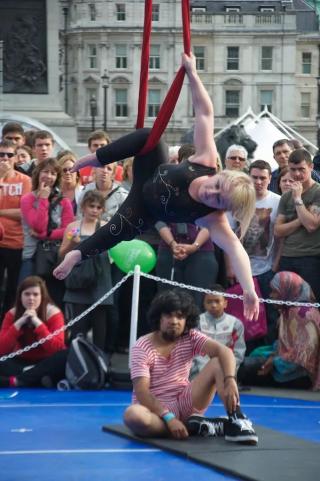Christine Hands, “Dance and Disability in the United Kingdom” (United Kingdom)
While the first professional dance company featuring disabled dancers was founded in Cleveland, Ohio, since then the United Kingdom has far surpassed the United States in the field of dance and disability. While there is a large research push in the US for representation of dancers with physical disability, there is an equally large gap in the training and development of these dancers. Research shows that one of the largest barriers for disabled dancers is training opportunities. Also lacking are opportunities for the training of dancers with intellectual and cognitive disability. In England, regular dance classes for dancers with and without disabilities (mixed abilities) abound.
I traveled to England and Scotland and connect with some of these organizations. I interviewed students, teachers, and directors, and observe and take class. I observed and participated from the standpoint of a scholar who considers education, community engagement, and choreography as part of the fabric of disability and dance. I asked what these companies are doing and what we can do better at home to expand the field. I sought opportunities for collaboration, whether that be teaching, assisting, or otherwise engaging with these organizations.
I focused on education and the training of dancers with disabilities. I looked particularly at youth education though I will also engage in and with adult classes. (Many dancers with disabilities, for a number of reasons, find dance later in life.) While I attended a range of classes, I specifically aimed to engage with companies and organizations training and presenting dancers with intellectual disability since this is the largest gap I have found in my research.
In London, weekly youth and adult classes are offered through Candoco Dance Company, Magpie Dance, and Amici Dance Company. In Guilford, England, Stopgap Dance Company has open classes as well as regular youth classes. In Glasgow, Scotland, Indepen-dance offers classes nearly every day of the week, including classes specifically geared for peoples with sensory processing disorders (autism). I researched how classes can be geared for peoples with specific disabilities, and how this alters the class structure and outcome. Far Flung Dance Theater in Southwest England is disability-led and offers a range of classes for peoples with disabilities. Nearby, in Cornwall, Shallal Dance Theater also has classes and performance opportunities for disabled dancers. I researched how these smaller coastal towns engage with their communities in meaningful ways.
Amici Dance Company in London and Anjali Dance Company in Oxfordshire, England both work exclusively with performers with intellectual disabilities. Both of these companies train intellectually disabled dancers for the stage. (David Leventhal, Director of Dance for Parkinson’s at the Mark Morris Dance Center, has offered to give me an introduction to Colm Gallagher, education director for Amici Dance which I utilized to make a connection.) I researched the innovative practices that these companies utilize for the onstage success of their company members.
-Christine Hands


